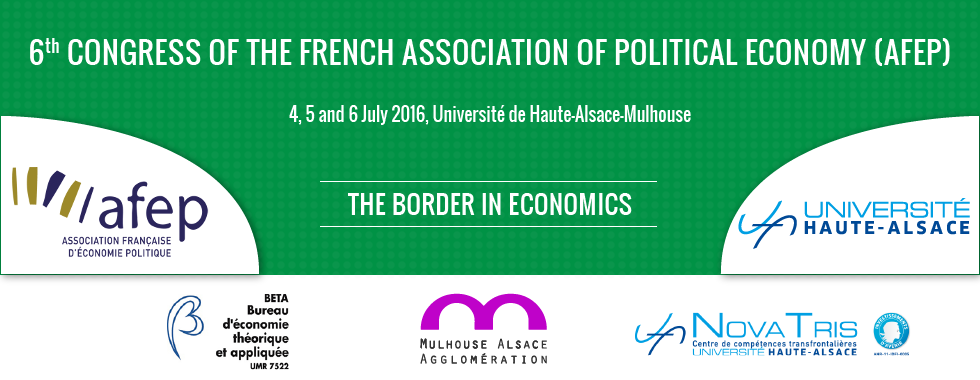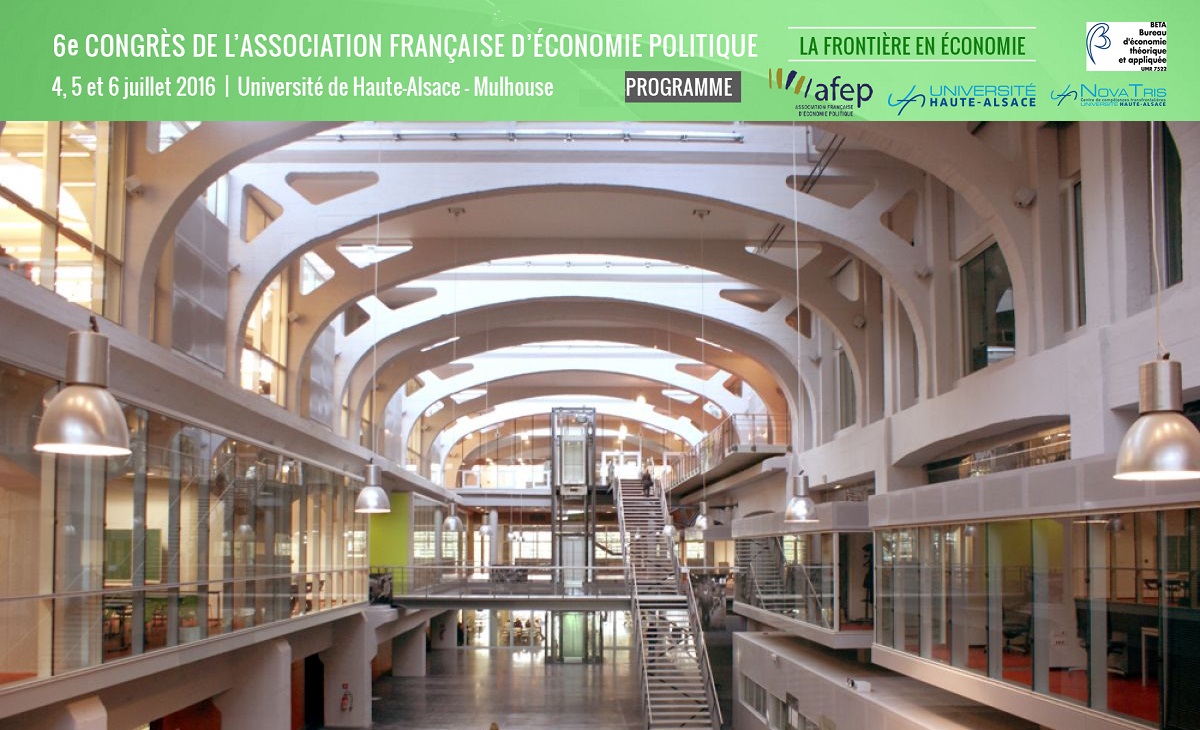
|
Practical details Program
To access the papers, please click on "Program" above or on "Sort papers by author", once logged in.
How to upload full papers
Call for papers "The border in economics"
While the notion of the invalidation of borders as a feature of globalization is widely disseminated by the media, we may reflect on the preservation, the displacement, the reinforcement or the transformation of barriers to exchange, specially after the diffusion of « information and communications technologies ». This topic of the border will be the central issue at the AFEP Congress, that will be held in Mulhouse, in a region where long-term history was characterized by border problems and border displacements. It will follow two main perpectives. In economics, the border first refers to barriers to exchange of commodities and to the free circulation of labor and capital. But relations of mainstream economics to the notion of space raise some questions. Frequent references to abstract territorial objects in international economics or in public economics may also be called into question. The claim by new international economics to be the first to take space into account is also controversial, considering many previous works that gave it pride of place – but remained, to be true, at the margins of the discipline (e.g. Marshall, Hotelling, von Thünen, Weber, Isard, Lösch, Christaller). While considering the state of these works, participants are invited to think about the ways in which more or less formal barriers linked to official borders do influence economic phenomena. Furthermore, the question of tax borders is raised in a time of deregulated finance globalization ; states try to recover control by various initiatives (FATCA, OECD/G20 project). Economic issues of diverse challenges to european borders will be specially considered : contesting the Schengen space when confronted to migration flows, revision of limits of the eurozone and of the European union (« Grexit », « Brexit »). Such questions are obviously not limited to the european case and may be discussed in other spaces. These issues open a large range of questions including the recent comeback of protectionist defense, strategies for setting up new firms, public policies for the management of trade flows, trans-border labor and consumption, practices of fiscal optimization, the governance of external and internal borders of the European union, or the latter’s fiscal harmonization. The second dimension refers to the field of epistemology, with the topic of frontiers of economics. Since the « dispute over methods » (Methodenstreit) until the AFEP struggle, the dispute is still present about the relations that economics ought to have – or not – with other social sciences and with politics. What could pluralistic economics signify, or the project of a social science of the economy ? We are invited to consider epistemological differences between economists, and divergences that result from mainly institutional issues. How can we interpret the embeddedness of recurrent controversies within economics in politico-institutional logics ? In this context, the dialogue with researchers coming from other geographic, institutional and diciplinary fields is highly recommendable. This second perspective calls for further and wider considerations on the present degree of opening of mainstream economics to other social sciences, on interfaces between economics and politics, history, law, sociology, geography, psychology, on the boundaries between heterodoxy and mainstream, on the definition of the field of economics, or issues touching methods for inquiry research, for teaching or for exposition in economics, on comparative relations between economics and other social sciences in international perspective. To discuss these wide-scale questions, opening the borders to other disciplines than economics will of course be appropriate. Lastly, while these two topics will constitute the base of 2016 Congress, propositions for contributions may touch all fields of political economy. NB: Although the language of the conference is French, you may submit and present a paper in English. Keynote speakers
Guillaume Duval, Olivier Godechot, Steve Keen, Marc Lavoie, Arnaud Lechevalier, André Mach, Kako Nubukpo...
How to submit The call for contributions involves two types of possible submissions. You may :
Fees The fees are:
Conference fees include lunch, cocktail, and coffee-breaks during the whole congress as well as gala diner. |
Important Dates Please note the deadlines for the following: Abstract submission: 30/04/2016 Decision notification: 15/05/2016 Registration and full paper submission: 15/06/2016 CONFERENCE ORGANISING COMMITTEE Jean-Daniel Boyer (Université de Strasbourg) CONFERENCE SCIENTIFIC COMMITTEE Bernard Chavance (Université Paris 7) |


